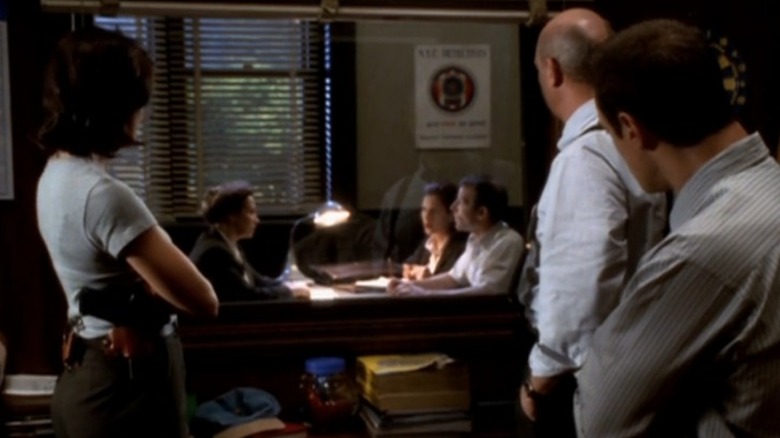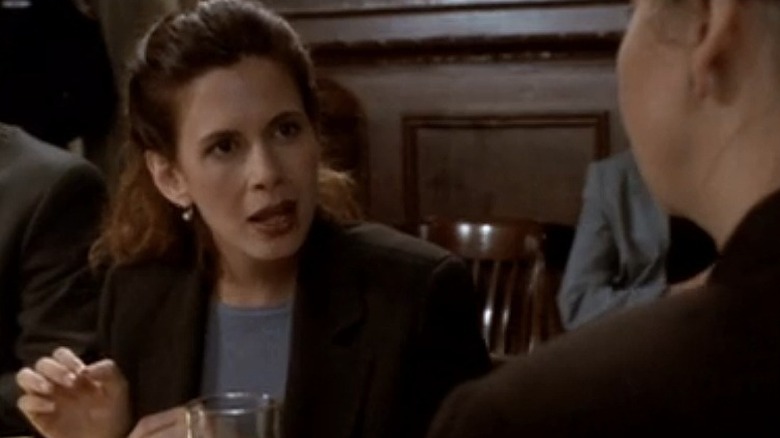The Best Courtroom Scene In Law & Order: SVU Season 1
In newer seasons, "Law & Order: Special Victims Unit" has moved away from exploring cases involving a legal or moral gray area, but there was a time when the series took its formulaic queue from the original "Law & Order." In its early years, the long-running spin-off balanced its more cut-and-dry, right vs. wrong episodes with investigations and trials that asked difficult questions about a variety of relevant issues, from the nature of intent to the constitutionality of various elements of the justice system. While the inaugural season of "Special Victims Unit" hadn't yet incorporated a recurring A.D.A. – and subsequently focused less on the "Law" portion of show's title — it did use a handful of depositions and testimony scenes to introduce viewers to themes and questions that would pop up frequently in the series' later seasons.
Only a few minutes into its pilot, for instance, viewers are introduced to the motivations of Christopher Meloni's Detective Elliot Stabler, as well as the ethos and mission of the Sex Crimes Unit, via his testimony in a case involving a flasher. In the scene, the detective is quick to clarify the difference between policing consensual acts of intimacy and protecting victims from offenders — a clarification the detectives must make repeatedly in the series' formative years, when they're frequently accused of being "the panty police." Though necessary to the series' set-up, its introductory courtroom scene isn't the season's most relevant or memorable. That distinction goes to a brief deposition that occurs in Episode 7.
An atypical perpetrator complicates the narrative for SVU detectives
Content warning: Sexual Assault
In the episode, titled "Uncivilized," a convicted sex offender named Bill Turbit (Stephen Bogardus) who's already served his time in prison and been paroled, is suspected in the assault and murder of a young boy. Despite the fact that Turbit was a model prisoner who, by all appearances, has adhered to the restrictions of his parole, the detectives are convinced (by the actual perpetrators, we'll later learn) that Turbit is guilty. Importantly, and unlike most violent sex offenders, Turbit committed his initial offense in an altered state, while "overloaded on a psychedelic S.T.P. cocktail." In other words, the reason the parole board felt he was unlikely to commit another offense is that his actions were dictated by a drug, not anything inherent in his pathology. Of course, all that matters little (understandably so) to his traumatized victim, and to the parents in his community who turn on Turbit once they learn who he is.
With no compelling evidence to convict Turbit, pressure from the public and media mounting, and the knowledge that sex offenders have a high recidivism rate, the squad and A.D.A. make a controversial move. For starters, the A.D.A. hesitates to inform opposing council that Turbit's alibi checks out. "The outraged citizens could care less about civil liberties when their kids are at risk," the D.A. tells Captain Cragen (Dann Florek), and in the episode's only courtroom scene, both the reality of that fact and the unconstitutionality of the real-world legislation (via AAPL) are examined.
'Uncivilized' asks complex questions, but refuses to answer them for its audience
The "Civil Commitment" bill discussed would allow states to lock up sex offenders permanently. In essence, despite having already served their time and been found sane enough to stand trial the first time around, these convicts would be found legally insane upon release, and committed to an asylum indefinitely. Cragen attempts go along with this plan, and the hearing that follows, though brief, brings up complex constitutional questions about both the duties of law enforcement and the limitations of the justice system.
After Turbit's attorney points out that he never committed a violent act during his twelve years in prison, she reiterates that he's already paid his debt to society for the one crime he did commit. "Isn't this whole legislation ... a cheesy end-run around the cherished legal concept of double jeopardy?" she asks, before calling the bill unconstitutional. Can a criminal really be punished, the episode asks, for crimes they've not yet committed?
In the pivotal scene, the viewer is forced to consider their own thoughts about where the rights of the community end and the rights of the individual begin. That Turbit's offense is unique in its psychology — and that he's innocent of the episode's central crime — hardly matter. The core of the episode lies in that one hearing, in a scene whose light touch and refusal to come down on one side of an argument would come to define the series for most of its earlier and more memorable episodes and seasons.
If you or anyone you know has been a victim of sexual assault, help is available. Visit the Rape, Abuse & Incest National Network website or contact RAINN's National Helpline at 1-800-656-HOPE (4673).


